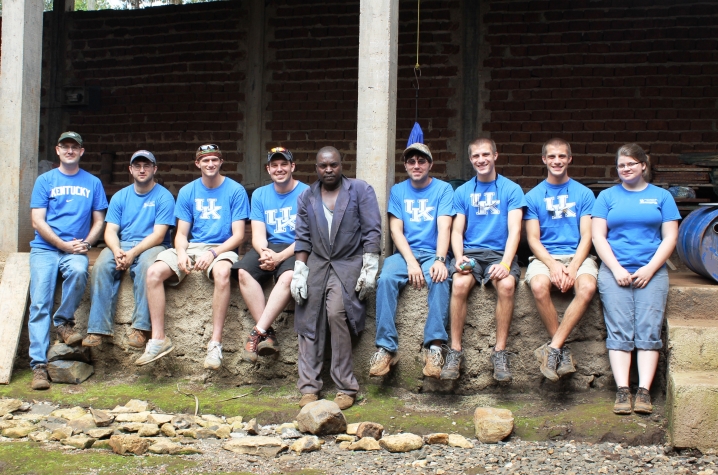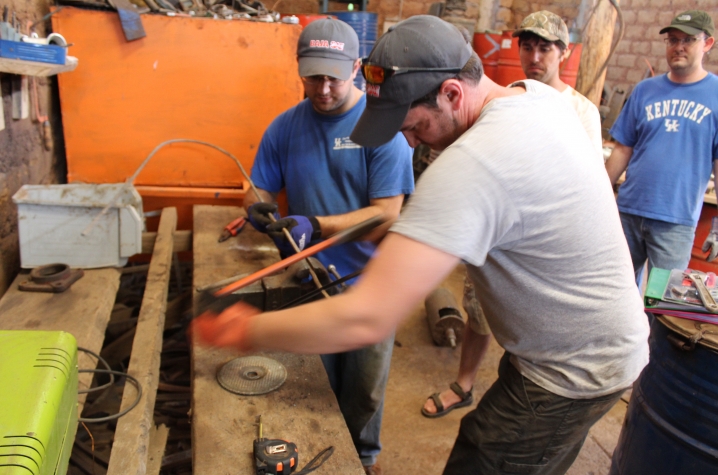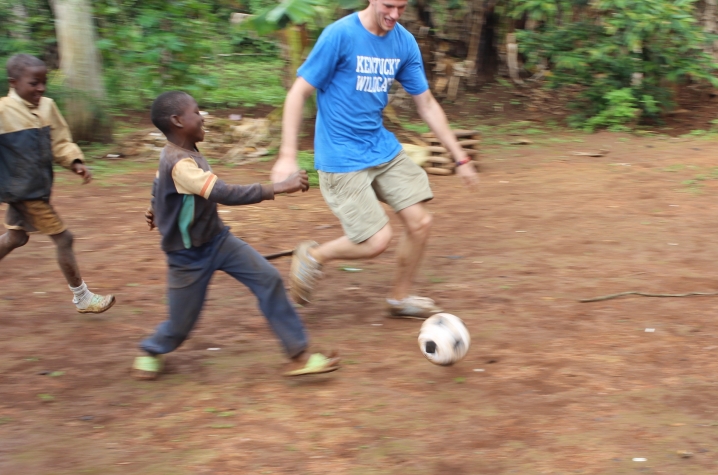UK Students Bring Renewable Energy Technology to Africa
PADUCAH, Ky. (July 19, 2012) — While Americans may complain about fuel prices, the availability and access to transportation fuel is something that most can take for granted. Several University of Kentucky College of Engineering students from the Paducah campus recently learned that is not necessarily so in other areas of the world.
Jeffery Seay, assistant professor of chemical and materials engineering at the UK Paducah campus, led seven UK Paducah chemical and mechanical engineering students in a design project to develop low-cost, environmentally friendly technologies to produce biodiesel for rural villagers in Cameroon, Africa. Seay and the students worked with the African Center for Renewable Energy and Sustainable Technology (ACREST) to design the process using resources and materials readily available in Cameroon. A 10-day trip to Bangang, Cameroon to work with the local villagers in implementing and refining the design was the culmination of the year-long project.
"To say the trip was eventful is an understatement," Seay said. "After over 18 hours of flying, our bus ride to the village of Bangang was the students' introduction to transportation difficulties in the developing world. The bus could not go up the muddy hillside road, so at about 10 p.m. we had to carry everything we brought — our supplies for the project, our personal belongings and supplies we brought for local school children — about three miles up the hillside in the pouring down rain. It took us over two hours to walk to the village."
According to Seay and the students, the trip got better. Working with ACREST technicians, the group implemented their reactor design. The principle behind the design, Seay said, was to construct the biodiesel processor for less than $100 in U.S. currency and to use construction and processing methods easily explained to people with little or no formal education. In addition, the students were charged with ensuring the materials used were readily available to locals. With old oil drums, car parts and scrap metal, the students constructed a processor that used wood or charcoal as heat.
Chris Sterrie, a senior mechanical engineering student from Paducah, worked on the processor. "The first thing we discovered is that the truth about engineering is being able to think outside the box. It isn’t that our basic design changed, it's more that we learned how to change the design to adapt to what we had," he said.
Sterrie and Bradley Butler, another senior mechanical engineering student from Paducah, were able to change their design to fit what was available and make the processor work.
"That first batch of biodiesel — and it was less than a gallon — was like looking at gold," Butler said. "A few days after we got home, I was at a gas station and a big truck pulled in and filled up with diesel. I don’t think I'll ever look at things like that the same."
Seay said that was an important lesson for the students. "Normally engineers would look to new technologies for a design project. What our students had to learn was how to use older technologies due to the lack of modern infrastructure."
Seay noted that while Bangang has approximately 200 homes, ACREST is able to provide low-cost electricity to only 15 of those. He explained that in pre-industrial times, ethanol, a key ingredient to produce biodiesel, was recovered from wood during the process of making charcoal. This method is still widely practiced in the developing world. In addition to methanol and vegetable oil, the other chemicals required can be extracted from wood ash, which is still used in developing countries to produce soap. Utilizing these methods the students were able to create an innovative, low-cost biodiesel processor for the village.
Christina Willett, a chemical engineering junior from Gilbertsville, Ky., said she did not realize the impact her career choice could make. "Seeing first-hand what engineering has done — and can do — for our world, made a huge impression on me," she said.
Mitchell Peeler, a chemical engineering junior from Eddyville, Ky.; Max Croft and William Croft, chemical engineering sophomores from Paducah, and Zac Watson, a mechanical engineering junior from Symsonia, Ky., found getting to know the villagers and their culture an important lesson as well. The students brought school supplies for the village school. But Peeler brought something he thought the local children would enjoy even more — a couple of futbols, or soccer balls.
"The local kids were so cool," Peeler said. "They would hang out with us and they loved to play futbol. So, we would go out there and play with them and they taught us some games as well. I think one of the things that really stood out to me was how they are just not time-oriented like we are here. They say 'no worries' and really mean it."
The Crofts said they were impressed with the villagers' hospitality. "Every evening they put food on the table for us. It was like whatever they had they offered to us," Max Croft said. His brother, William, agreed. "It was a lesson, that's for sure. I think I learned that we have so much and that we all have a choice to make a difference. It's shown us a whole world of engineering opportunities that we hadn’t thought of before."
Watson said he hopes to make the trip again. "I think it would be cool to be able to go again and see the results of what we started. To be able to keep making improvements to what we've done would be great."
Seay said in light of the project's success and his recently awarded funding from the EPA's People, Prosperity and the Planet Program, he plans to continue developing the processor.
The UK College of Engineering in Paducah offers area students the opportunity to achieve a UK four-year Bachelor of Science degree in chemical or mechanical engineering. Working in partnership with WKCTC and Murray State, UK-Paducah students take all classes on the UK Paducah Campus. The program has graduated more than 140 engineers since its beginning in 1997.
MEDIA CONTACT: Jenny Wells, (859) 257-5343; Jenny.Wells@uky.edu







